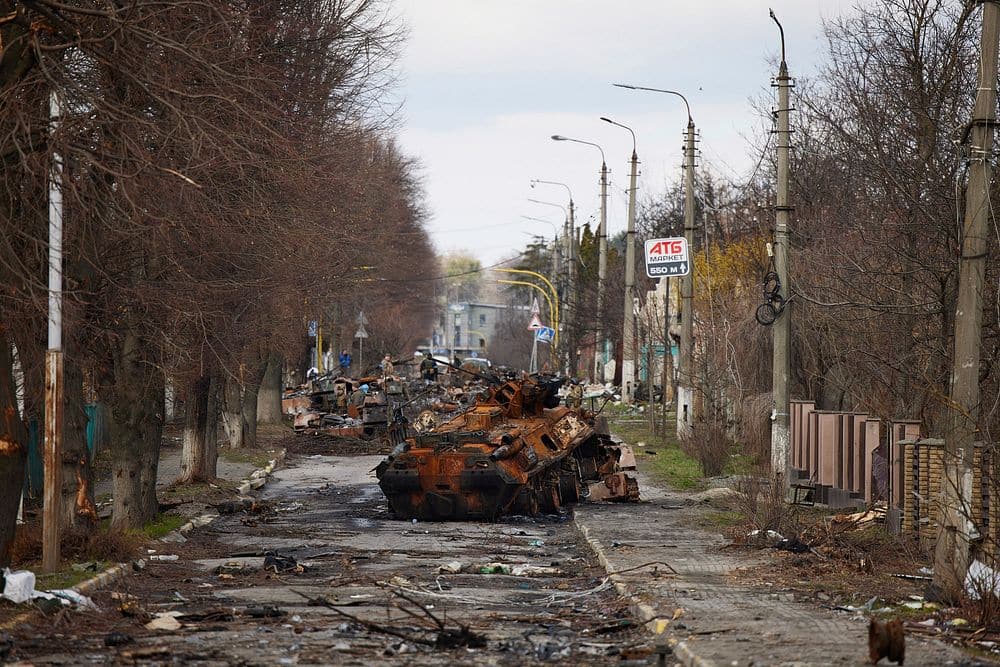Image: Destroyed Russian tanks in Bucha, near Kyiv. Source.
As the war still rages on in Eastern Ukraine, European, U.S. and Ukrainian policymakers are drafting plans for reconstruction and reform. Although the current situation offers opportunities for more structural reform, it will be a substantial challenge to both rebuild the seriously damaged country while also integrating it into the European Union. It is estimated that between $500 billion and $1 trillion worth of aid, loans and investments are needed to help the country back on its feet.
This article assesses the challenges for Ukraine in rebuilding the country in a way that offers broad prosperity to its population while detaching it from oligarchs and Russian influence. One the one hand, effective governance mechanisms and anti-corruption bodies are essential to regulate the reconstruction efforts. On the other, involvement of a broad coalition of civil society actors is crucial to make the transition of Ukraine to a European state equitable and fair for all.
Corruption, vested interests and the need for oversight
In the past decades, and especially since the 2014 Maidan revolution, serious efforts have been made to combat the rampant corruption in Ukraine. The country struggles with a legacy of vested interests, institutionalized corruption and bad governance. This is apparent in the wealth concentration with a small group of individuals, corruption of and low trust in the judiciary and inadequate oversight mechanisms. Such issues have seriously hampered Ukraine’s economic and democratic development in the past and are likely to do so in the future if the government fails to address these issues.
Problematizing the fight against corruption is the regular involvement of government officials (up to the highest level) in corruption scandals. Some of the largest companies in Ukraine are still so-called state-owned enterprises (SOE). In the past, these SOE’s have been convenient vehicles for corruption within the crony capitalist economy of Ukraine. The growing role of both the state and SOE’s in the Ukrainian (post-)war economy highlights the need for independent oversight mechanisms.
Recently, Ukrainian government officials prosecuted former CEO’s and executives for embezzlement and nepotism. Although it is a good start, the legitimacy of the judiciary has been eroded by decades of corruption. Further reforms of the judiciary are highly necessary. The prosecution of oligarchs and corrupt officials would create more favourable conditions for reconstruction and could restore the remarkably low trust of Ukrainian citizens in the judicial system.
Monitoring incoming capital flows
The degree of success of the reconstruction efforts in Ukraine is highly dependent on the extent to which capital flows can be effectively coordinated. Hundreds of billions of dollars and euros will be invested by state and private actors in a relatively short period. In a country plagued by corruption in both the state and private domain, such an influx represents a large risk for embezzlement.
As became clear in other EU accession procedures, the establishment of solid, independent anti-corruption institutions can go a long way in minimizing such risks. Besides that, effective due diligence mechanisms ought to be in place to make sure that the streams of incoming capital end up in the right place.
Support and involvement NGO’s and local government
To address democratic challenges and push for inclusive reconstruction efforts, a vibrant civil society is crucial. NGOs can fulfil an important watchdog role, monitoring and scrutinising government and corporate conduct. Investigative journalism, for example, plays a large role in laying bear corrupt schemes in society. There are regular reports of Ukrainian journalists researching corruption being harassed in their home and being labelled as pro-Russian actors. They have also been subjected to video surveillance and wiretapping by the government.
Besides a watchdog-role, NGOs can push for the inclusion of marginalised groups in Ukraine’s reconstruction. There is, for example, a lack of gender perspectives in the current recovery and reconstruction plans. Advancing the participation of all groups in Ukrainian society is crucial to creating broad prosperity in the country.
Ukrainian NGOs often lack the institutional capacity, sufficient funding and human capital to effectively address the challenges they will face during reconstruction. Financial and organisational support is therefore crucial to prepare these NGOs for the challenges ahead. Besides that, pushing for a seat for civil society groups at relevant decision-making tables would help in providing additional perspectives in structuring reconstruction efforts.
Finally, capacity-building and involvement of local governments in decision-making processes is pivotal. Building durable local governance diminishes oligarch control and gives local governments more ownership and decision-making capacity. Ukraine has already made significant advancements in this domain but continued commitment is needed to solidify and increase gains made.
Protection of labour rights and maintaining union capacity
As Ukraine was already among the poorest countries in Europe, social policies and legislation are even more necessary as it emerges from the war. Labour unions have historically been a driving force for social issues and workers’ rights in Ukraine. Recent efforts by ruling party MPs to sidestep the longstanding system of dialogue between unions and employers are highly problematic.
Moreover, the ruling Servant of the People (SN) party has sought to implement controversial labour reforms that would deregulate the workplace and further diminish the role of trade unions. The proposals do not align with EU labour standards and could potentially hinder the accession. Even though there are signals that SN is moving away from its initial neo-liberal tendencies, its policies and proposals do not fully reflect this. Supporting and strengthening unions should therefore be a top priority to ensure the bargaining position of Ukrainian workers.
Want to read more about progressive visions towards Ukraine’s reconstruction? Read “Europe and the War in Ukraine”, a 2023 book by FEPS with much more analysis on this topic: https://feps-europe.eu/publication/europe-and-the-war-in-ukraine/



